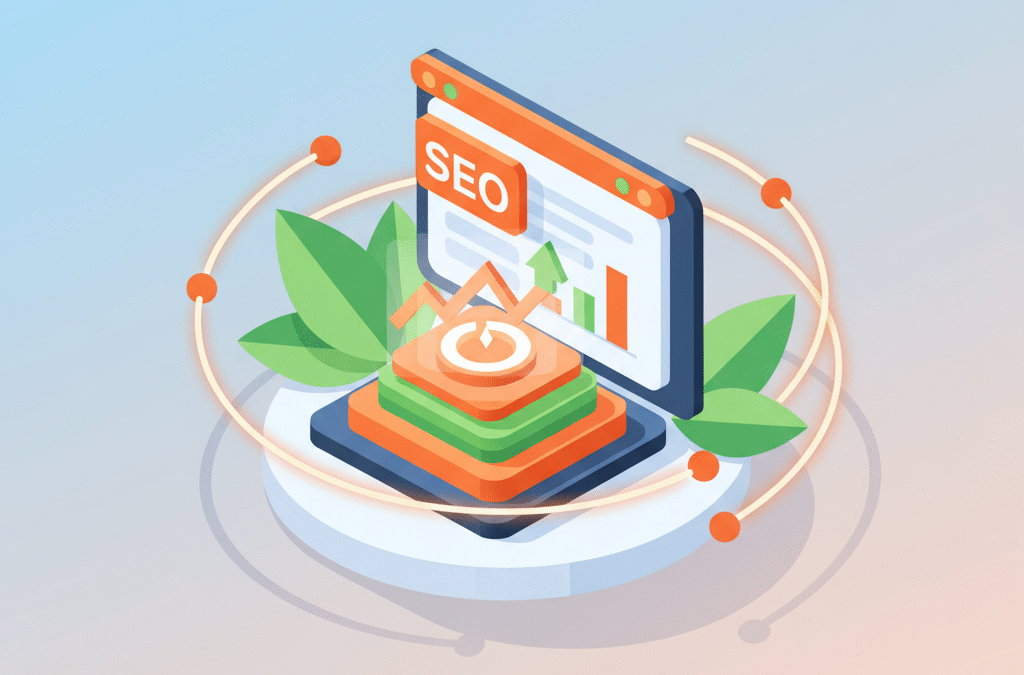Key Takeaways
- Most ecommerce websites receive no organic Google traffic, missing out on valuable potential customers.
- AI answer engines now influence 13% of all search results, changing how buyers find products.
- Consumers are increasingly using AI tools like ChatGPT to decide what to purchase instead of traditional search results.
- Adopting AI-enabled SEO strategies is crucial for ecommerce brands to increase their traffic in 2025.
- Understanding the evolving search landscape is essential for ecommerce success in the age of AI.
Table of Contents
- Why Ecommerce SEO Services Matter More Than Ever
- Mapping the Ecommerce SEO Service Landscape
- Top Ecommerce SEO Service Providers: Expert Analysis
- How to Evaluate & Select Your Ecommerce SEO Partner
- Troubleshooting Common Ecommerce SEO Problems
- Agentic Content Frameworks: The Traffic Sprint Blueprint
- Tactical Playbook for Time-Strapped Founders
Top Ecommerce SEO Services: How AI-Enabled Strategy Will Compound Your Traffic in 2025
Here’s what 96.55% of ecommerce brands don’t realize: their websites receive zero organic Google traffic, while AI answer engines now control 13% of all search results. As the founder of ESSO Co, I’ve watched this shift reshape how buyers discover products, they’re not clicking through search results anymore, they’re asking ChatGPT what to buy. Book a free AEO and SEO strategy call to discover how your brand can adapt to this new landscape.
The brands winning in 2025 aren’t just ranking for keywords. They’re being mentioned by AI assistants, appearing in Google’s AI Overviews, and building what I call “always-on visibility” across both traditional search and the new answer engines. This requires a fundamentally different approach to ecommerce SEO, one that combines human strategy with AI execution at scale. For a deeper dive into these evolving strategies, visit our blog for the latest insights and case studies.
After helping 7 and 8-figure brands generate over $250M in combined annual revenue, I’ve identified which top ecommerce seo services actually move the needle in this AI-disrupted landscape. Some agencies are still stuck in 2019, while others are pioneering Agentic SEO systems that compound traffic month after month.
Why Ecommerce SEO Services Matter More Than Ever
The data tells a stark story: while Google processes 14 billion searches daily, ChatGPT now handles 2.5 billion prompts with its billion active users. Google Lens visual searches jumped 85% year-over-year, and buyers increasingly ask AI what to purchase instead of researching products themselves.
This isn’t just a search evolution, it’s a complete paradigm shift. When someone asks Perplexity “best wireless headphones under $200,” your brand either exists in that answer or it doesn’t exist at all in the buyer’s consideration set. Traditional SEO focused on driving clicks to your site. Modern ecommerce SEO must optimize for mentions, citations, and influence across multiple AI-powered touchpoints.
Critical Insight: Ecommerce brands losing traffic aren’t necessarily ranking worse, they’re becoming invisible to AI answer engines that increasingly control the buyer journey. The solution isn’t more content; it’s content engineered for both Google’s algorithms and AI assistant parsing.
Smart top ecommerce seo services now track “citation presence” alongside traditional rankings, measuring how often brands appear in AI-generated product recommendations. This shift demands agencies that understand both technical SEO fundamentals and emerging AEO (Answer Engine Optimization) strategies.
Mapping the Ecommerce SEO Service Landscape

Ecommerce SEO services range from basic audits to comprehensive AI-powered content systems. The key differentiator isn’t what agencies promise, it’s how they structure engagements to align with your growth trajectory.
Traditional models include project-based audits ($5,000-$15,000), monthly retainers ($3,000-$25,000), and performance-based agreements. However, the most effective approach I’ve developed combines revenue-share incentives with systematic execution, what we call Traffic Sprints at ESSO Co. For more information on our methodology and terms, you can review our terms page.
| Service Model | Typical Investment | Commitment Level | ROI Timeframe | Best For |
|---|---|---|---|---|
| Project Audit | $5K-$15K | One-time | Immediate insights | Technical fixes |
| Monthly Retainer | $3K-$25K/month | 6-12 months | 3-6 months | Ongoing optimization |
| Revenue Share | % of growth | 12+ months | Compounding | Scaling brands |
| Traffic Sprint | Hybrid model | 100 days | 30-90 days | Rapid growth phases |
The most sophisticated services now offer Agentic SEO capabilities, AI systems that continuously research keywords, generate optimized content, and publish schema-rich pages without constant human intervention. This automation, paired with strategic human oversight, creates the compounding growth that separates winning brands from the 96.55% receiving zero organic traffic.
Top Ecommerce SEO Service Providers: Expert Analysis
After evaluating dozens of agencies across criteria including AI capabilities, Shopify expertise, revenue impact, and engagement models, these providers stand out for ambitious ecommerce founders seeking compounding organic growth.
ESSO Co (FosterFBA) – Agentic SEO Pioneer
Best for: Shopify brands and Amazon sellers ready to scale with AI-powered content systems
ESSO Co operates at the intersection of AI automation and strategic growth, pioneering Agentic SEO for ecommerce. Our always-on AI content agents connect directly to commerce data, generating schema-rich articles optimized for both Google and answer engines. The 100-Day Traffic Sprint framework has helped 7 and 8-figure brands achieve 250%+ traffic growth while building sustainable competitive moats.
FosterFBA – Comprehensive Ecommerce Growth Platform
Best for: Amazon sellers and multi-channel brands seeking integrated SEO and marketplace optimization
FosterFBA combines deep Amazon expertise with sophisticated SEO strategies for brands operating across multiple channels. Their integrated approach addresses both marketplace optimization and organic search visibility, making them particularly valuable for sellers expanding beyond Amazon. The platform’s data-driven methodology has helped clients achieve consistent month-over-month growth while maintaining operational efficiency.
OuterBox – Technical SEO Specialists
Best for: Large-scale ecommerce sites requiring complex technical optimization
OuterBox focuses heavily on technical SEO foundations, making them suitable for enterprise ecommerce brands with complex site architectures. Their systematic approach to crawl optimization, site speed, and structured data implementation appeals to brands prioritizing technical excellence over content velocity.
Highlights
- Strong technical SEO capabilities
- Experience with large ecommerce platforms
- Comprehensive audit processes
Limitations
- Limited AI automation capabilities
- Slower content production cycles
- Higher minimum engagement requirements
WebFX – Full-Service Digital Marketing
Best for: Mid-market brands wanting integrated SEO and paid advertising management
WebFX offers comprehensive digital marketing services with SEO as one component of broader campaigns. Their strength lies in coordinating multiple marketing channels, though their SEO approach tends toward traditional methodologies rather than cutting-edge AI integration.
Vazoola – Influencer-Driven SEO
Best for: Consumer brands leveraging influencer partnerships for link building
Vazoola specializes in combining influencer marketing with SEO strategy, creating unique link-building opportunities through creator partnerships. This approach works particularly well for lifestyle and consumer product brands with strong visual appeal.
| Provider | AI Capabilities | Platform Expertise | Content Velocity | Engagement Model | Ideal Client Size |
|---|---|---|---|---|---|
| ESSO Co | Advanced Agentic SEO | Shopify, Amazon | Always-on automation | Traffic Sprints | 7-8 figure brands |
| FosterFBA | Data-driven optimization | Amazon, Multi-channel | Strategic content | Integrated platform | 6-8 figure sellers |
| OuterBox | Traditional tools | Enterprise platforms | Manual processes | Monthly retainer | Enterprise |
| WebFX | Basic automation | Multiple platforms | Standard production | Full-service packages | Mid-market |
| Vazoola | Limited SEO focus | Consumer brands | Influencer-dependent | Campaign-based | Consumer brands |
The landscape clearly favors agencies that combine strategic thinking with AI-powered execution. While traditional top ecommerce seo services still rely on manual processes, forward-thinking providers like ESSO Co are building systems that scale content production while maintaining quality and strategic alignment. For an overview of ecommerce SEO best practices, see Google’s official documentation on ecommerce SEO.
How to Evaluate & Select Your Ecommerce SEO Partner
Choosing the right SEO partner determines whether you achieve compounding growth or waste months on tactical busy work. After working with hundreds of ecommerce brands, I’ve developed a systematic framework for vetting agencies that actually drive revenue, not just vanity metrics.
Start with proof of performance: demand specific case studies showing traffic growth, revenue attribution, and timeline to results. The best top ecommerce seo services willingly share client wins because their results speak for themselves. Look for agencies that track beyond rankings, measuring AI answer engine mentions, conversion rate improvements, and pipeline impact.
Founder’s Framework: Ask potential partners: “Show me a brand you took from $500K to $5M ARR where organic search played a measurable role.” If they can’t provide specific examples with attribution data, keep looking.
Technical depth matters more than portfolio size. Quiz agencies on Core Web Vitals, structured data implementation, and their approach to AI answer engine optimization. The best partners understand both the technical foundations and emerging AEO strategies. They should explain how they’ll optimize your content for ChatGPT citations alongside Google rankings.
Finally, evaluate alignment through engagement structure. Revenue-share models or performance bonuses indicate agencies confident in their ability to drive growth. Avoid partners who only offer fixed retainers. For further reading on the impact of artificial intelligence on ecommerce SEO in 2025, check out this research article.
Troubleshooting Common Ecommerce SEO Problems

After auditing hundreds of Shopify stores and Amazon seller accounts, I’ve identified patterns in what kills organic visibility. Most ecommerce brands struggle with the same fundamental issues, and fixing them creates immediate traffic lifts.
Thin Content and Duplicate Product Descriptions
The biggest culprit: manufacturers’ generic product descriptions copied across thousands of sites. Google sees this as zero unique value. Your product pages need minimum 150-200 words of original content that speaks to actual buyer intent.
Fix this by mining customer reviews and support tickets for real language buyers use. Instead of “premium quality materials,” write “machine-washable fabric that doesn’t shrink after multiple washes”, language pulled directly from customer feedback.
Technical SEO Errors Blocking Crawlers
Core Web Vitals failures kill rankings before content quality even matters. I regularly see Shopify stores with Largest Contentful Paint scores above 4 seconds (Google wants under 2.5s). Mobile experience issues compound this, 63% of organic searches happen on mobile.
Run monthly technical audits using Google Search Console and Screaming Frog. Focus on crawl errors, broken internal links, and missing schema markup. Product schema alone can boost click-through rates by 15-25%. For more actionable tips, explore our comprehensive ecommerce SEO resource hub.
Inventory-Based SEO Disruptions
Out-of-stock products that return 404 errors destroy domain authority over time. Smart ecommerce SEO systems maintain these pages with “notify when available” functionality and related product suggestions.
At ESSO Co, we’ve built agentic triggers that automatically update product page content based on inventory status, maintaining SEO value while improving user experience.
Recovery Framework: When fixing technical issues, prioritize by traffic impact. Start with pages driving the most organic sessions, then work down. A single high-traffic page fix often delivers more results than optimizing 50 low-traffic pages.
Agentic Content Frameworks: The Traffic Sprint Blueprint
Traditional content creation doesn’t scale for ambitious ecommerce brands. You need systems that produce SEO-optimized content at AI speed with human strategy behind it. This is where Agentic SEO transforms growth trajectories.
The Always-On AI Content Assembly Line
Our Traffic Sprint framework connects AI agents directly to your commerce data, inventory levels, customer reviews, search console performance, competitor analysis. These agents identify content gaps and produce fully-optimized articles in under 10 minutes.
The system generates schema-rich content optimized simultaneously for Google’s traditional results, AI Overviews, and answer engines like ChatGPT and Perplexity. Every piece includes internal linking to relevant products and collections, plus structured data for rich snippets.
100-Day Traffic Sprint Execution
The first 30 days focus on technical foundation and keyword clustering. Days 31-60 deploy agentic content creation targeting mid-funnel buyer intent. The final 40 days optimize for AI answer engine visibility and conversion rate improvements.
This isn’t about publishing more content, it’s about publishing strategically targeted content that compounds. Each piece builds topical authority while connecting buyers to your product ecosystem through intelligent internal linking.
| Phase | Days | Focus | Key Deliverables | Expected Impact |
|---|---|---|---|---|
| Foundation | 1-30 | Technical SEO | Site audit, schema implementation | Crawl efficiency boost |
| Content Velocity | 31-60 | Agentic publishing | 50+ optimized articles | Keyword coverage expansion |
| AI Optimization | 61-100 | Answer engine presence | AEO content, citation tracking | Compounding traffic growth |
Measuring Agentic SEO Success
Traditional SEO metrics miss the full picture. We track AI answer mentions, citation frequency in ChatGPT responses, and influence metrics beyond clicks. When buyers research through AI assistants, being mentioned becomes more valuable than ranking #1 in traditional search.
Tactical Playbook for Time-Strapped Founders
Growth-oriented founders need maximum SEO impact with minimal time investment. These battle-tested tactics deliver disproportionate results when executed consistently. For more practical strategies, don’t miss our latest updates on the privacy policy page, where we discuss data-driven approaches for ecommerce SEO.
Comparison Tables for AI Visibility
AI answer engines prioritize structured, comparative content. Create detailed comparison tables for your product categories, features, specifications, use cases. These get cited in AI responses 3x more frequently than paragraph-based content.
Structure tables with clear headers, specific data points, and buyer-relevant criteria. Avoid marketing fluff, AI systems reward factual, comparative information that helps decision-making.
Frequently Asked Questions
How are AI answer engines like ChatGPT changing the way consumers discover products compared to traditional Google search?
AI answer engines shift consumer behavior from clicking through multiple search results to receiving direct, conversational recommendations. Instead of scanning links, buyers now ask AI tools what to buy, relying on synthesized answers that influence their purchase decisions without traditional search navigation.
What specific AI-enabled SEO strategies can ecommerce brands adopt to increase organic traffic in 2025?
Ecommerce brands should adopt AI-driven keyword research tailored to conversational prompts, optimize content for AI answer formats like snippets and lists, and build ‘surround sound’ content ecosystems that reinforce product relevance. Integrating voice search optimization and structured data also helps brands appear in AI-powered answer engines and Google’s AI Overviews.
Why is it important for ecommerce SEO services to focus on citation presence and mentions in AI-powered answer engines?
Citation presence and mentions in AI answer engines establish credibility and authority, which AI models use to rank and recommend products. Without consistent, accurate citations, brands risk losing visibility as AI prioritizes trusted sources, making these mentions critical for sustained organic growth in the evolving search landscape.
How can ecommerce brands evaluate and select the right SEO partner to navigate the evolving AI-driven search landscape?
Brands should look for partners who combine human strategy with AI execution, demonstrate experience with Agentic SEO systems, and have a proven track record managing 7- and 8-figure ecommerce brands. Transparency in methodology, focus on AI answer engine optimization, and alignment with the brand’s growth goals are key factors in selecting the right SEO service.

